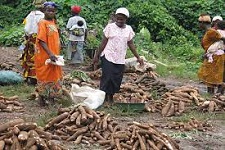With the objective of impacting the lives of millions of people in Africa’s most populous country, the African Development Bank’s Board of Directors on Monday approved a $210 million loan to the Government of Nigeria.
The loan will co-finance Phase 1 of the Nigeria Special Agro-Industrial Processing Zone Program. The program will help to unlock Nigeria’s agriculture sector potential. It will promote industrialization through the development of strategic crops and livestock.
African Development Bank financing for this program represents one of the Bank’s most ambitious operations in terms of scale and scope to date. It is made up of an African Development Bank loan of $160 million and an Africa Growing Together Fund loan of $50 million. Phase 1 of the project will target seven Nigerian states and the country’s Federal Capital Territory.
The project will support Nigeria’s efforts to raise agricultural productivity, promote investment, create wealth and jobs, and transform rural areas into corridors of economic prosperity. Its first phase will be implemented with co-financing from other partners in the amount of $538.05 million.
“We have several million hectares of available arable land and have embarked on the creation of Special Agriculture Processing Zones across the country,” Nigeria’s President Muhammadu Buhari told world leaders at the recent Future Investment Initiative Summit in Riyadh, ahead of Monday’s Bank Board meeting. “These initiatives, we believe, will make it easier for investors in agriculture,” Buhari added.
The Special Agro-Industrial Processing Zones Program is expected to bring economic infrastructure to rural areas of high agricultural potential. These zones will attract private agro-industrialist and entrepreneur investment, contribute to Nigeria’s economic and social development, and stem rural-to-urban migration. The project areas account for 19% of Nigeria’s total land mass and will benefit 50.4 million people. The states where the first phase of the program will be implemented were selected based on a readiness criterion as well as the need to ensure geographical balance across Nigeria’s six geo-political zones.
In addition to African Development Bank financing for Phase 1 of the Nigeria project, the Islamic Development Bank and the International Fund for Agricultural Development will provide parallel co-financing. Nigeria’s federal and state governments will contribute both in cash and in kind.
African Development Bank Group President Dr Akinwumi A. Adesina said: “This first phase of the program is not government-driven. It is government-enabled and private sector led. That is the critical way in which you have structural transformation of agriculture. It is impressive to see a strong commitment from the Nigerian government – a very strong commitment from the Nigerian Minister of Finance and from all of the state governments because they have to give the land, they make sure that all the regulations and incentives are provided.”
Nigeria Phase 1 Zone construction is expected to augment the following value chain commodities:
Cross River State – cocoa, rice and cassava
Federal Capital Territory – beef, dairy, and livestock
Imo State – beef and dairy livestock
Kaduna State – tomato, maize and ginger
Kano State – rice, tomato, groundnuts and sesame oil
Kwara State – livestock
Ogun State – cassava, rice, poultry and fisheries
Oyo State – cassava, soybean, rice
The African Development Bank’s Special Agro-Industrial Processing Zones is a flagship of the Bank’s Feed Africa Strategy. The Bank plans to establish these zones in 18 African countries, including Nigeria. The zones are designed to concentrate production, processing, storage, transport and the marketing of commodities – like cotton or maize to increase productivity and competitiveness and reduce logistics costs.
The Director General of the Bank’s Nigeria Country Office, Lamin Barrow, said: “Phase 1 of the Nigeria Special Agro-Industrial Processing Zones Program will mobilize private sector investment in the agro-industrial hubs and agricultural transformation centers. It will impact some 1.5 million households as direct beneficiaries, with a target of creating 400,000 direct jobs and up to 1.6 million indirect jobs.”
Often planned near secondary cities, the agro-industrial hubs are designed to revitalize peri-urban economies and create jobs for women, men, and young people. It includes a $2 million budget for a gender action plan that will provide agro-industrial hub gender-sensitive guidelines, workshops for women-led agricultural cooperatives, and capacity-building training for women, among other gender-focused priorities.
The African Development Bank’s Vice President for Agriculture, Human and Social Development, Beth Dunford, said: “Equitable employment and economic opportunities are a cornerstone of the Bank’s work. This program will target at least 50% women participation. The gender action plan will help ensure that there’s facilitation of broader lending to women.”

